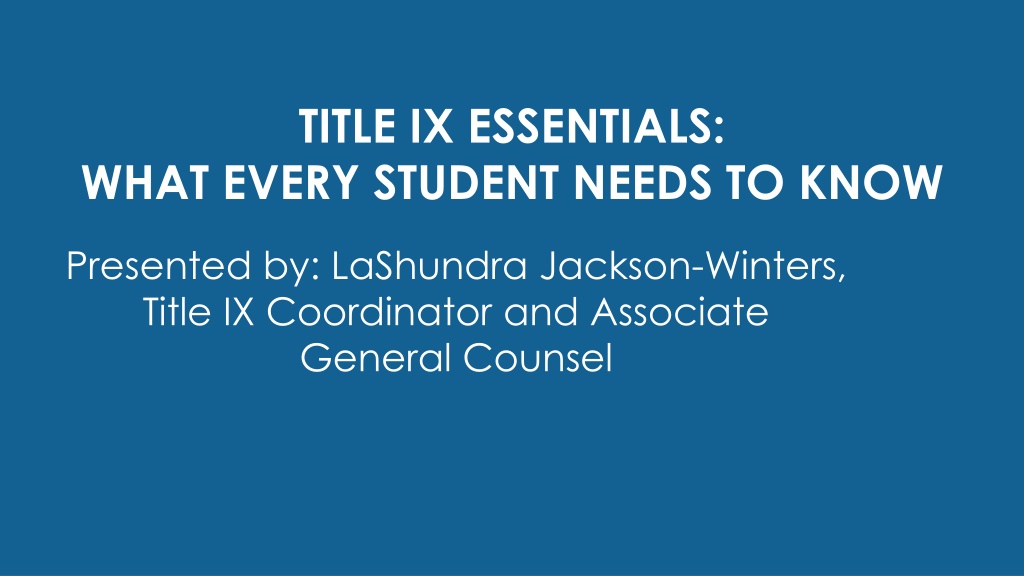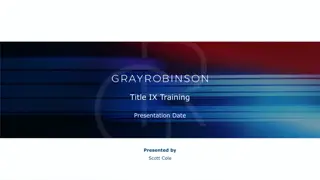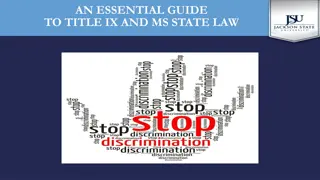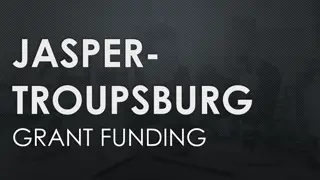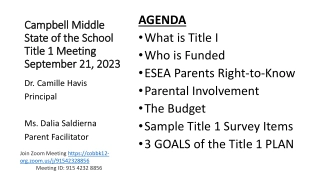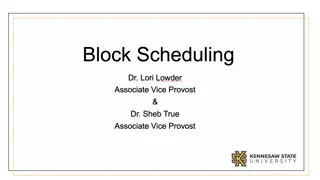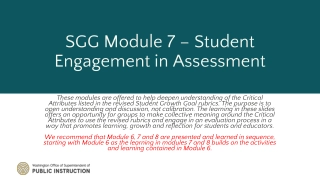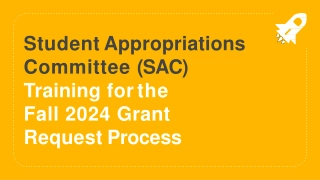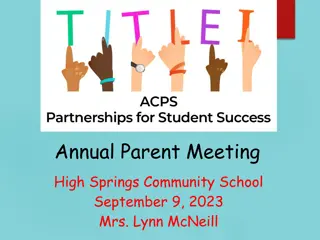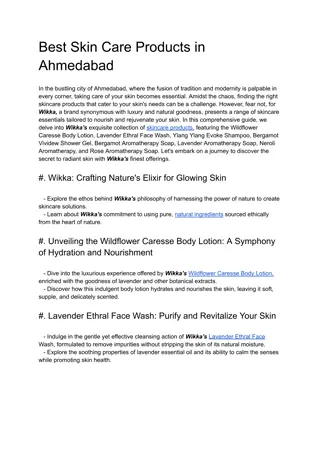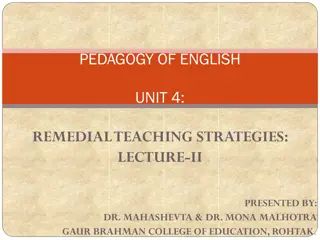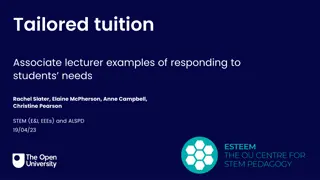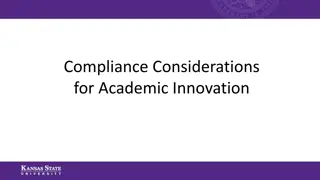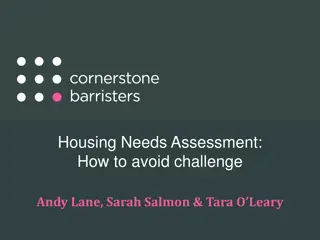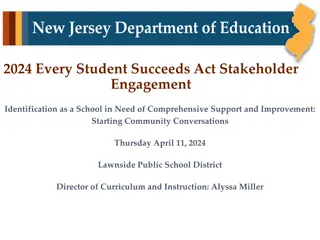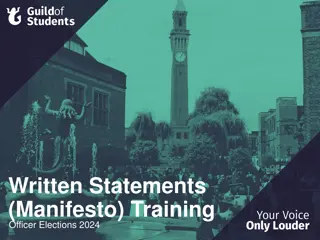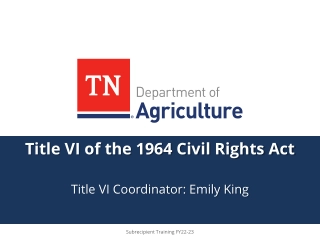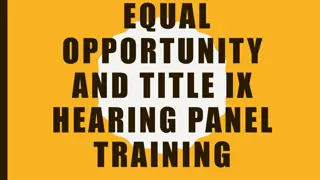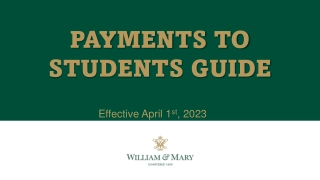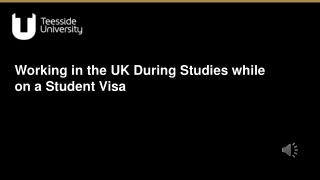TITLE IX ESSENTIALS: WHAT EVERY STUDENT NEEDS TO KNOW
Title IX of the Education Amendments of 1972 prohibits sex-based discrimination in educational programs and activities at federally funded universities. This law protects against sex discrimination and sexual harassment, outlining the roles of the Title IX Coordinator and the reporting processes for incidents of discrimination or violence. It covers definitions of sexual harassment, reporting obligations, on-campus vs. off-campus scenarios, and the responsibility of universities to address complaints promptly and effectively.
TITLE IX ESSENTIALS: WHAT EVERY STUDENT NEEDS TO KNOW
PowerPoint presentation about 'TITLE IX ESSENTIALS: WHAT EVERY STUDENT NEEDS TO KNOW'. This presentation describes the topic on Title IX of the Education Amendments of 1972 prohibits sex-based discrimination in educational programs and activities at federally funded universities. This law protects against sex discrimination and sexual harassment, outlining the roles of the Title IX Coordinator and the reporting processes for incidents of discrimination or violence. It covers definitions of sexual harassment, reporting obligations, on-campus vs. off-campus scenarios, and the responsibility of universities to address complaints promptly and effectively.. Download this presentation absolutely free.
Presentation Transcript
TITLE IX ESSENTIALS: WHAT EVERY STUDENT NEEDS TO KNOW Presented by: LaShundra Jackson-Winters, Title IX Coordinator and Associate General Counsel
WHAT IS TITLE IX? Title IX of the Education Amendments of 1972 is a federal civil rights law that prohibits discrimination on the basis of sex (and gender) on a University campus in its educational programs and activities when the University is federally funded. Title IX protects against sex discrimination and sexual harassment.
TITLE IX OFFICE The position of Title IX Coordinator is required by law. The Title IX office has a duty and an obligation to investigate allegations of discrimination and harassment based on sex. The Title IX Coordinator oversees the processes that address reported concerns or claims of sex or gender based harassment, discrimination, misconduct or violence. The Title IX office will gather as much information and evidence as possible in order to conduct a thorough and fair investigation.
WHAT SHOULD I REPORT? Under Title IX, discrimination on the basis of sex also includes sexual harassment, which includes: sexual assault, rape, acquaintance rape, stalking, relationship violence (domestic violence and dating violence), or any other discrimination or harassment based on sex. It is a violation of University policy as well as applicable law to commit or to attempt to commit these acts.
ON-CAMPUS VS. OFF-CAMPUS Title IX applies to reports of sexual harassment in education programs and activities which include the following: Buildings or other locations that are part of the school s operations, including remote learning platforms; Off-campus settings if the school exercised substantial control over the respondent and the context in which the alleged sexual harassment occurred; and Off-campus buildings owned or controlled by a student organization officially recognized by the University, such as a building owned by a recognized fraternity or sorority.
WHAT DOES THIS MEAN FOR US The University has a duty to promptly respond to complaints of sexual harassment and sexual violence in a way that limits its effects and prevents its recurrence. Complainants of sexual harassment or sexual violence might be faculty, staff, or students. A complainant can be a male or female. A respondent can be a male or female.
WHO NEEDS TO REPORT? ANYONE who experiences, observes, or hears about an incident of sexual harassment or sex discrimination should report it to the Title IX Coordinator as soon as possible.
TITLE IX OFFICE The Title IX Coordinator works closely with Student Affairs, Academic Affairs, Human Resources, Campus Police and other University offices when required. The Title IX office only investigates the allegations; it does not make the final determination. At the conclusion of the investigation, a panel of adjudicators will make the determination regarding responsibility. Jackson State University s Title IX office is located on the 8thfloor of the Administration Tower.
UNLAWFUL DISCRIMINATION AND HARASSMENT The University is dedicated to enforcing civil rights laws to protect all students from unlawful discrimination and harassment based on race, color, national origin, sex, disability, and age. This includes students who are lesbian, gay, bisexual, transgender, queer, questioning, asexual, intersex, nonbinary, and individuals who identify their sexual orientation or gender identity in other ways (LGBTQI+).
SEX DISCRIMINATION Sex Discrimination unfairly treating an individual or group of individuals differently than others on the basis of sex or gender. Sexual misconduct is a form of sex/gender based discrimination.
EXAMPLES OF SEX DISCRIMINATION - Bullying, - Harassment, - Exclusion from school activities, and - Other forms of discrimination that can interfere with LGBTQI+ students access to a safe and inclusive school environment.
SEXUAL HARASSMENT Sexual Harassment is any unwelcome conduct that a reasonable person would find so severe, pervasive and objectively offensive that it denies a person equal education access. Conduct is considered unwelcome if the person did not request or invite it and considered the conduct to be undesirable or offensive.
Sexual harassment means bothering someone in a sexual way.
EXAMPLES OF SEXUAL HARASSMENT (NONVERBAL) Nonverbal May include, but not limited to the following: staring at someone for an unnatural period of time (i.e. undressing someone with one s eyes ); blowing kisses; Winking or licking of one s lips in a suggestive manner; displaying/showing sexually oriented pictures or cartoons; using/showing sexually oriented screen savers; or making lewd or obscene gestures with one s hands.
EXAMPLES OF SEXUAL HARASSMENT (VERBAL) Verbal May include telling jokes; using sexually explicit profanity or threats; describing sexual encounters with others; suggesting sexual activity; whistling in a sexually suggestive manner; using terms such as honey , babe , sweetheart , dear ; repeated requests for dates, etc.
EXAMPLES OF SEXUAL HARASSMENT (PHYSICAL CONTACT) Physical Contact May include touching, patting, pinching, bumping, groping, cornering or blocking a passageway, kissing, providing unsolicited back or neck rubs Bottom Line: Any unwanted physical contact.
WHAT IS CONSIDERED SEXUAL HARASSMENT (RECAP) * Unwelcome sexual advances; * Requests for sexual favors; * Verbal, nonverbal, or physical conduct of a sexual nature by an employee, by another student, or by a third party
Sexual harassment must persist over a long period of time to be actionable.
A consensual sexual relationship between two people cannot be deemed sexual harassment.
SEX OFFENSES Any sexual act directed against another person, without the consent of the complainant, including instances where the complainant is incapable of giving consent. * Fondling The touching of the private body parts of another person for the purpose of sexual gratification, without the consent of the complainant, including instances where the complainant is incapable of giving consent because of his/her age or because of his/her temporary or permanent mental incapacity. * Incest Sexual intercourse between persons who are related to each other within the degrees wherein marriage is prohibited by law. * Statutory Rape Sexual intercourse with a person who is under the statutory age of consent.
If you believe that you have been sexually harassed, you do not need to confront the harasser to give him or her a chance to correct the behavior before reporting the conduct.
This Photo by Unknown Author is licensed under CC BY There is no requirement that you confront the harasser.
SEXUAL ASSAULT The term sexual assault means any nonconsensual sexual act including when the victim lacks capacity to consent.
WHAT IS CONSENT? Consent is an understandable exchange of affirmative actions or words which indicate an active, knowing and voluntary agreement to engage in mutually agreed upon sexual activity. Consent is not freely given when it is in response to force or threat of force or when a person is incapacitated by the (voluntary or involuntary) use of drugs or alcohol or when the person is otherwise physically helpless and the person performing the act knows or should reasonably know that the other person is incapacitated or otherwise physically helpless. An action is done without that person s consent when it is inflicted upon a person who has not freely and actively given consent.
CONSENT AND SEXUAL ASSAULT A person is not required to physically resist sexual conduct in order to show lack of consent. Past consent for sexual activity does not imply ongoing future consent. Sexual activity without consent is sexual assault or rape. The decision to have any type of sexual behavior must be free of force.
CONSENT VS. FORCE Consent must be willing. Force can be either physical or emotional. Examples of physical force: Kidnapping, holding someone down, using weapons, taking advantage of someone when they are incapacitated due to drug or alcohol use. Examples of emotional force: threats, peer pressure, blackmail, guilt or coercion.
RECAP WHAT IS CONSENT? An agreement made when both parties verbally express that they want to engage in sexual activity. This includes: Mutual; and Voluntary; and Talked about it before hand
RECAP CONSENT IS NOT: * * * * The absence of NO Implied or assumed even in a relationship Silence or not responding (not answering the question) Saying yes because you are afraid to say no (threats, coercion, blackmail) I m not sure ; I don t know ; I m scared Consent for one act does not mean consent for all acts. Consent given once before does not mean always and every time. Being passed out or sleeping does not equal consent. * * * *
DATING AND DOMESTIC VIOLENCE Dating/Domestic violence is a pattern of abusive behavior used to exert power and control over a partner. Dating/Domestic violence can be physical, sexual, emotional, or psychological actions or threats of actions that influence another person.
STALKING Stalking is a course of conduct directed at a specific person that would cause a reasonable person to fear for his/her safety or the safety of others, or to suffer emotional distress. Stalking may include repeatedly following, harassing, threatening, or intimidating another.
INTERIM/SUPPORTIVE MEASURES Campus escort No Contact Order On-campus housing accommodations Counseling services Medical services Class accommodations Ban from campus/on-campus housing
SCENARIO # 1 John and Jane meet at a party. They spend the evening together dancing and getting to know each other. John convinces Jane to come up to John s room. John tells Jane that if she comes up to his room they are going to have sex. Jane comes up to John s room. From 11:00pm until 3:00am, John uses every line John can think of to convince Jane to have sex, but Jane refuses. John keeps at Jane and begins to question her religious beliefs, and accuses Jane of being a tease. At last, it seems to John that Jane s resolve is weakening, and John convinces Jane to touch his genitals. Jane would never have done it but for John s persistence. John feels that Jane wanted to do it all along but was playing shy. Why else would Jane come to the room? She could have just left, right?
John perpetrated sexual assault against Jane by using coercion to obtain sexual contact, pressuring Jane to an unreasonable level. Where sexual activity is coerced, IT IS FORCED. Sexual contact without consent is sexual assault.
SCENARIO # 2 Riley and Parker are dating. Parker is uncertain about whether they should have sex, but Riley is persuasive and finally obtains Parker s voluntary agreement. As they engage in sex, Parker says wait, stop, that hurts. Riley nonetheless continues for several more minutes, ignoring Parker. Afterwards, Parker is upset. Riley apologizes, but says they were too far into it to stop.
Although Parker initially consented, that consent was withdrawn. At any point, if consent is withdrawn, any sexual contact beyond that point is sexual assault.
WHO DO YOU TELL? CAN I JUST TELL THE POLICE? Law enforcement involvement does not relieve the institution from investigating under Title IX. You may have a Title IX violation without a criminal violation (standard of proof is different). Complainant may not want to notify the police.
POINTS TO REMEMBER The University is committed to ensuring a community that is safe for all who study, live, work, and visit here. Please report incidents of sex discrimination, sexual harassment or sexual violence. Though it may be difficult, immediate reporting allows for the best possible efforts to support the complainant, investigate the claims, and to prevent a recurrence.
RESOURCES Jackson State University Police Department Campus Police (601)979-2580 Latasha Norman Counseling Center Applied Psychological Services (601)979-0374 (601)979-3381 Title IX Office (601) 979-1315 (601) 979-6804 (601) 927-4766
